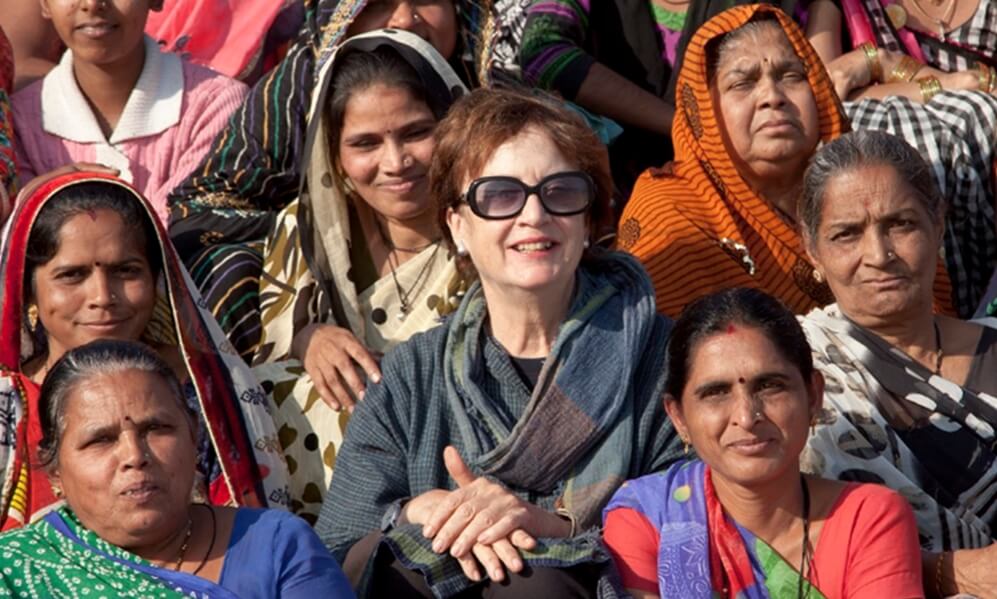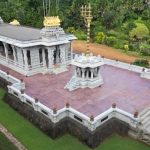“American by birth, Indian by heart.” That’s what the people of Maheshwar, a temple town on the Narmada River in central India, say about their beloved Sally didi. 82-year-old Sally Holkar is a living embodiment of what Mother Teresa, Sister Nivedita, Jim Corbett, and Annie Besant did to India, their lifetime home away from home. While America became a most sought-after destination for Indians seeking prosperity post 1950, Sally Holkar from Texas made India her home in the 1960s and dedicated her life to reviving a dying craft – the Maheswari art of weaving.
Born in Dallas, Sally Holkar is not just an art preservationist but also a family member of the legendary Ahilyabai Holkar, the ruling queen of Indore and founder of Maheshwar in the 18th century. The Government of India honored Sally with Padma Shri in 2025, alongside four Indian American awardees, for her lifetime contributions to empowering women weavers and carrying forward the legacy of Rajmata Ahilyabai.

Sally’s journey to India from the US began with love. While studying political science at Stanford University, she met Richard Holkar, son of the last Maharaja of Indore and a descendent of Queen Ahilyabai. After tying the knot with him in 1967, she moved to India and became the first firangi bahu of the Holkar royal family without knowing the greater purpose of this cultural transition in her life. Restoring Ahilyabai’s fading craft – the art of weaving Maheshwari fabrics – to its glory at international level became the mission of her life.
“I was more at home in India than in Dallas,” she once said while recalling her early years in India as an American bride. “I was overwhelmed with the royal hospitality at the palace in Indore. A cup of tea meant that the whole table would be covered with food,” she fondly recalled. Just when Sally, who once dreamed of having a country life in Texas, started feeling at home amid the decorum of the Holkar family, they had to vacate the palace. In 1971, the Government of India abolished the privy purse system forcing the Holkars to leave the palace in Indore.
It was a blessing in disguise for Sally Holkar. They relocated to the 250-year-old Ahilya Fort in Maheshwar that Ahilyabai herself had established as the seat of the Holkar dynasty in Madhya Pradesh. One evening in 1978, as Sally and Richard were strolling to the river ghat, they crossed paths with an elderly weaver carrying a fine Maheshwari sari folded over his arm. The man humbly shared how the weavers community was struggling to survive due to the fading glory of Maheshwari weaving traditions that Queen Ahilyabai had introduced.
The chance encounter became a turning point for her. Moved by the sorry state of the weavers and the elegant beauty of the art form, Sally vowed to bring the age-old weaving traditions back to life and generate employment for the Maheshwari weavers. She co-founded the Rehwa Society, a nonprofit weaving cooperative, with an initial grant of Rs 80,000 from India’s welfare board. The Rehwa Society started with 12 handlooms and a dozen local women weavers.
In those days, communication in the local language was a big challenge for Sally, a Padma Shri awardee. But language barriers with the rural weavers did not stop her. She set out on the mission with hope, humility, and patience. By ensuring fare wages, the Rehwa Society attracted women weavers to join the looms, and thus, Ahilyabai’s Maheshwar progressively regained its identity as a weaving hub. In 2003, she founded WomenWeave to support single mothers and widows from marginalized sections by training them in spinning and weaving.
Thus, Maheshwar became the final destination of her epic journey that had started from Dallas to India in 1967. Her journey continued with the launch of the Handloom School in 2015 to train young weavers from across the country, focusing on a seamless blend of Maheshwari traditions, contemporary designs and international standards. She has empowered over 5000 artisans, 90% of those are women. Their creations travel to not only premium exhibitions across India but also more than 20 countries.
Like Alfred Ford from Detroit, who spent years shaping his Guru’s vision of the world’s largest Radha-Krishna temple in India, Sally Holkar dedicated her life to the sacred cause of Maheshwar. The bride from America, who once knew nothing of saris, became a connoisseur of Indian handloom textiles. She even draped in nine yards of elegant Maheshwari silk saris for many years, blending in with the local culture. She became a most revered daughter of Maheshwar for the villagers, a transition from her being a daughter-in-law of Indore’s royal family.
This exclusive story is brought to you by Travel Beats, a leading overseas Indian community portal. Travel Beats is a subsidiary of Indian Eagle, the most trusted air-ticketing partner of Indians abroad for travel between USA and India. Subscribe to our newsletter for the latest Indian community news and stories.




